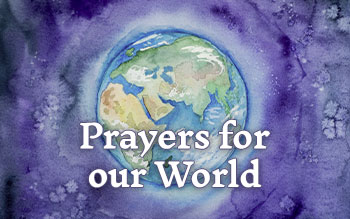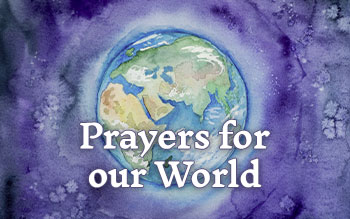Displaying items by tag: military coup
Sudan: military dissolves government, arrests leaders
The Sudanese military have declared a state of emergency and dissolved civilian rule, an event which many had feared. They have been at odds with civilian leaders since Omar al-Bashir was overthrown two years ago. time. Recently there was a pro-military sit-in outside the presidential palace, then a week later counter-protests were held, supporting the civilian government. Now more protests have been called by pro-democracy groups to ‘counter the military coup’. Sudan could be set for yet another period of showdown between the armed forces and the people. The country has made huge strides in normalising ties with the West and unlocking much-needed funding. The promise of democracy has kept many allies hopeful. But that is at risk now. The World Bank and the US have stopped aid to Sudan, and the African Union has suspended Sudan from all its activities. See
Guinea: Soldiers plan a transitional government
On September 6th soldiers seized power, dissolved the government and detained Guinea’s President Conde. Colonel Mamady Doumbouya, a former French legionnaire, and his army want a transitional government and a new constitution. He announced on TV that all land and air borders are shut, the government is dissolved and ‘Guinea no longer entrusts politics to one man, we will entrust it to the people.’ Conde's popularity plummeted after he changed the constitution so that he could stand again. This caused protests killing dozens. Doumbouya released 80+ political prisoners who had campaigned against the constitutional change and met the heads of Guinea’s various military branches to unify the armed forces under his command. West Africa’s regional bloc (ECOWAS) suspended Guinea’s membership on 7th September and sent a high-level mission to Guinea on the 9th to re-examine its position. ECOWAS was criticised by activists for remaining silent about Conde’s third-term bid.
Myanmar – ‘Future lies in darkness’
The situation in Myanmar continues to deteriorate. The devastation is highlighted by Khaing Sandi Win Min, First Secretary at Myanmar's Permanent Mission in Geneva and a member of the Civil disobedience movement opposed to the Military Junta. See here. She writes that since the military coup, Myanmar’s security forces have viciously attacked those protesting peacefully against the military’s seizure of power on February 1. Even away from the streets, the people of Myanmar have been forced to endure brutal human rights violations and crimes against humanity committed by the state’s security forces. Each day and night has become a nightmare for the people. The future of Myanmar lies in darkness.
The systematic and targeted acts of the military and security forces have led to the deaths of more than 750 people, including dozens of children. The junta has also arbitrarily arrested, charged, and sentenced more than 3,400 people. While in custody, many have been subject to various forms of torture, and, in the case of women and girls, sexual harassment and assault. The death toll is increasing daily. The security forces are also targeting the family members as hostages, in order to track down those wanted for participation in anti-coup protests.
Under Myanmar’s junta, fundamental freedoms, including the right to life, freedom of expression, freedom of religion, the right to privacy, and private property rights, have been all but swept away.
All of Myanmar’s people – whether protestors, social influencers, those joining the Civil Disobedience Movement (CDM), or those simply trying to keep their heads down – are living with fear every second, every minute, and every hour. With the economy in a state of collapse, The U.N. World Food Program has estimated that in the coming six months, hunger will hit 3.4 million people in Myanmar, especially in urban areas.
Christians in Myanmar continue to asking fellow believers to join in prayer for their nation following the military takeover in February. It is particularly difficult to live as a Christian in Myanmar at present. Churches have been raided in the wake of the coup, which has been followed by a brutal crackdown on pro-democracy supporters and protesters.
 Many Christians have also lost their livelihoods as well as seeing their Churches raided on a regular basis.
Many Christians have also lost their livelihoods as well as seeing their Churches raided on a regular basis.
Pastors have been doubly hard hit by the pandemic because Covid-19 has prevented Christians from going to church, meaning the pastors are unable to collect the tithes that pay their livelihoods and building rent. Christians in Myanmar have told Open Doors of their fears of night raids on their homes by security forces. Another described "living in fear" on a daily basis.
The cost of food and basic necessities has doubled in the crisis, with many Christian families going without enough food to eat and being unable to go to work for fear of their safety. See here
As we stand with our Brothers and Sisters, we look to these prayer points which have been shared with us:
1. Civil war is breaking out in various places and civilians and ethnic armed groups are fighting back. They are filled with anger from decades of injustice.
Please pray for Godly ways to challenge this military dictatorship.
2. Food prices have gone up 30% and banks are struggling with cash. People have to stand in line half the day just to get access to Limited amounts of cash. The poor and internal refugees are heavily hit.
Please pray for the church to be active in sharing God's goodness and practical blessing.
3. Youth are without a future. Schools and universities have been shut for over a year. Many are distraught. drugs, human trafficking and joblessness are causing a heavy toll on this generation.
Please pray for healthy and inspiring opportunities for the new generation. That they may encounter God's purposes for their lives and a vision in this crisis.
4. The harvest fields are ripe like never before. Many are hungry for Truth, Justice and answers that they are unable to find in Buddhism and Hinduism and Islam.
Please pray for the church to be active, engaged and inspired to be salt and light and transform this nation.
5. We haven't heard from the elected govt for over 100 days.
Please pray that they may encounter God, have a vision of Righteousness for Myanmar and that they may lead with Godly principles of govt.
6. There is fear in the general public. Many are arrested at night and snatched from their homes. The army is using heavy weapons to target civilians. If they lose a battle with ethnic armed groups, they retaliate by shooting at villages from the air. Many are hiding in jungles as a result.
Please pray for protection and failure of weapons and plans that aim to cause havoc amongst the innocent.
Myanmar: army promises new elections amid protests
The military held its first news conference since toppling the government. They said the armed forces would not remain in power for long, and would ‘hand power back to the winning party’ following another election. On 18 February the military ordered more arrests, and civil servants went on strike. Large numbers have protested for 16 days. ‘It is incredible to witness that our people are unified. People’s power must return to the people,’ actor Lu Min wrote on Facebook. Many of the country’s lawyers have joined the Red Ribbon Campaign calling for the restoration of democracy in the country. The Defend Lawyers website reported that forty barristers could face prosecution for participating in the anti-coup movement. Doctors Without Borders are ‘gravely concerned’ about the recent arrests and detentions of health care workers and other civilians. The situation has the potential to severely interrupt the lifesaving healthcare that they and others have been providing to the most vulnerable people in the country, particularly in the time of the Covid pandemic.
Myanmar: military coup
Myanmar's military took power on 1 February. Aung San Suu Kyi and her National League for Democracy party are now under arrest. The coup ends a democratic experiment in a country where generals usually rule. In 2017 Suu Kyi shocked the West by defending the generals’ ‘ethnic cleansing’ of the Rohingya Muslims. But as her star faded in the West, it became brighter at home where the Rohingya are considered invaders. Riding on her popularity, her party won last November's election, intensifying tensions between the civilian government and the army. The generals only won 7% of the vote and cried election fraud, threatening to suspend the constitution if their claims were not investigated. This coup reverses the generals' declining influence in one fell swoop. The new leader, Senior General Min Aung Hlaing, will remain in charge until 2022. Meanwhile, the economy will be crippled by fresh international sanctions, and Myanmar will become the pariah it was a decade ago. There have been widespread civilian protests against the coup, and the military have responded by shutting down Facebook ‘for the sake of stability’.
SUDAN: coup Military leader vows to ‘uproot regime’
The leader of Sudan's interim military council has vowed to "uproot the regime" two days after a military coup.
Speaking on TV, Lt-Gen Abdel Fattah Abdelrahman Burhan announced the restructuring of state institutions, the end of a night curfew and the release of political prisoners.
Protests continue despite the ousting of long-time leader Omar al-Bashir.
Demonstrators have demanded an immediate move to civilian rule and vow to stay in the streets.
Gen Burhan, who replaced the coup leader after he resigned on Friday, also dissolved all provincial governments and pledged respect for human rights.
The army would maintain "peace, order and security" across Sudan during an already announced transition period that would last at most two years until elections could be and civilian rule introduced, he added.
Using a more conciliatory tone, Gen Burhan also called on the opposition to "help us restore normal life", promised to try those who killed demonstrators and vowed a war on corruption.
The speech followed the resignation of feared security chief Gen Salah Gosh hours after the coup leader himself, Defence Minister Awad Ibn Auf, stepped aside. No official reason has been given for either departure.
Later on Saturday the army named Lt Gen Mohamed Hamdan Dagalo as the deputy head of the Transitional Military Council.
Known by the nickname "Hemeti", the general commands the paramilitary Rapid Support Force (RSF), which grew out of the government-backed Janjaweed militia.
The Janjaweed are accused of carrying out atrocities in the western region of Darfur in the early 2000s.
What has the opposition said?
Opposition groups have met the military to discuss "transitional arrangements".
Protester spokesman Mohammad Youssef al-Mustafa told the BBC they insisted on the immediate creation of a civilian government, but said military figures would be allowed a role in it.
And according to the privately-owned Baj News website the leader of the opposition Sudanese Congress Party, Omar el-Digeir, said representatives had demanded a civilian government with "full executive powers" and a role for civilians during the transition.
He also said they were waiting for the army to release jailed demonstrators, as promised.
The Sudan Professionals Association (SPA), which has been spearheading the demonstrations, said the council's response "did not achieve any of the demands of the people" and urged protests to continue.
Among its demands are the restructuring of state security, the arrest of "corrupt leaders" and the dissolution of militias that operated under former President Bashir.
How did we get here?
When Mr Bashir was removed, he was replaced by a military council led by Mr Ibn Auf.
But demonstrators camping out outside army headquarters in the capital Khartoum refused to disperse, rejecting Mr Ibn Auf as an ally of Mr Bashir.
Mr Ibn Auf was head of military intelligence during the Darfur conflict and the US imposed sanctions on him in 2007.
On Friday the new leader announced he was resigning and being replaced by Gen Burhan, who is seen as a less controversial figure.
Protestors have called for the abolition of "arbitrary decisions by leaders that do not represent the people" and the detention of "all symbols of the former regime who were involved in crimes against the people".
"Until these demands are fully met, we must continue with our sit-in at the General Command of the Armed Forces," the SPA said.
On Saturday, Sudanese TV reported the resignation of Gen Gosh, head of the National Intelligence and Security Service (NISS) which has powerful forces within the capital.
The general has been a key ally of Mr Bashir since the early 1990s and is among 17 Sudanese officials indicted for genocide, human right abuses and war crimes in the Darfur region by the International Criminal Court (ICC) in 2009.
The NISS has extensive powers and influence, supervising the paramilitary Rapid Support Forces.
More:https://www.bbc.co.uk/news/world-africa-47918736
Pray for a peaceful transition back to democratic elections
Pray that those who have led unjustly or corruptly will be held accountable.
Pray that the interim leaders do not take unfair advantage of the situation.
Sudan: Bashir in prison - protests continue
The fall of President Bashir has intensified a competition for influence in Sudan, one of Africa’s biggest countries. Talks between the new military rulers, who have now arrested two of his brothers, and protesters demanding a civilian government continue, as thousands remain camped outside Khartoum army headquarters. Omar al-Bashir is under tight guard in a maximum-security prison. Uganda said it would consider offering asylum if he applied, despite an arrest warrant issued by the International Criminal Court (ICC). The generals now running Sudan said Bashir will not be transferred to the ICC but will be tried in Sudan. Meanwhile demonstrators have vowed to stay on the streets, pressing for women's rights and the handover of power to the people. Hundreds of doctors marched in Khartoum on 18 April to get rid of the regime.






